Glamour Gab Of Hollywood
His name is Mike Lane, and you’d better keep an eye on him. In his first picture, he’s done the impossible—stolen the show from a pair of terrific pros, Humphrey Bogart and Rod Steiger. Bogie and Rod don’t like that, but I think you’ll like Mike—and the film, “The Harder They Fall.”
The picture may very well help toward cleaning up some of the rotten aspects of the fight racket. For sure, it will clean up at the box office. It’s no average prizefight picture. It’s a heartbreaker, based on Primo Carnera’s story.
Primo, you may recall, is the giant some sharp fight promoters brought up from South America. They got rich, while all poor innocent Carnera got were his wits almost beaten out of him.
That’s the role Mike Lane plays, and he does it in a way that tears you apart. However, Mike is not dumb. Although he is six-feet five, for publicity’s sake, Columbia is saying he’s six-feet nine. They even had three-inch lifts put on his shoes while shooting “The Harder They Fall.”
Twenty-three, unmarried, and unbelievably broad-shouldered, Mike has made it the hard way. What makes him startling are the reasons why he hasn’t wed, doesn’t drink, never smokes, and is violent when it comes to the subject of dope addiction.
Mike’s reactions, plus his appearance, are why I think he has a great chance at stardom. I never knew any star who didn’t react as distinctively as he or she looked.
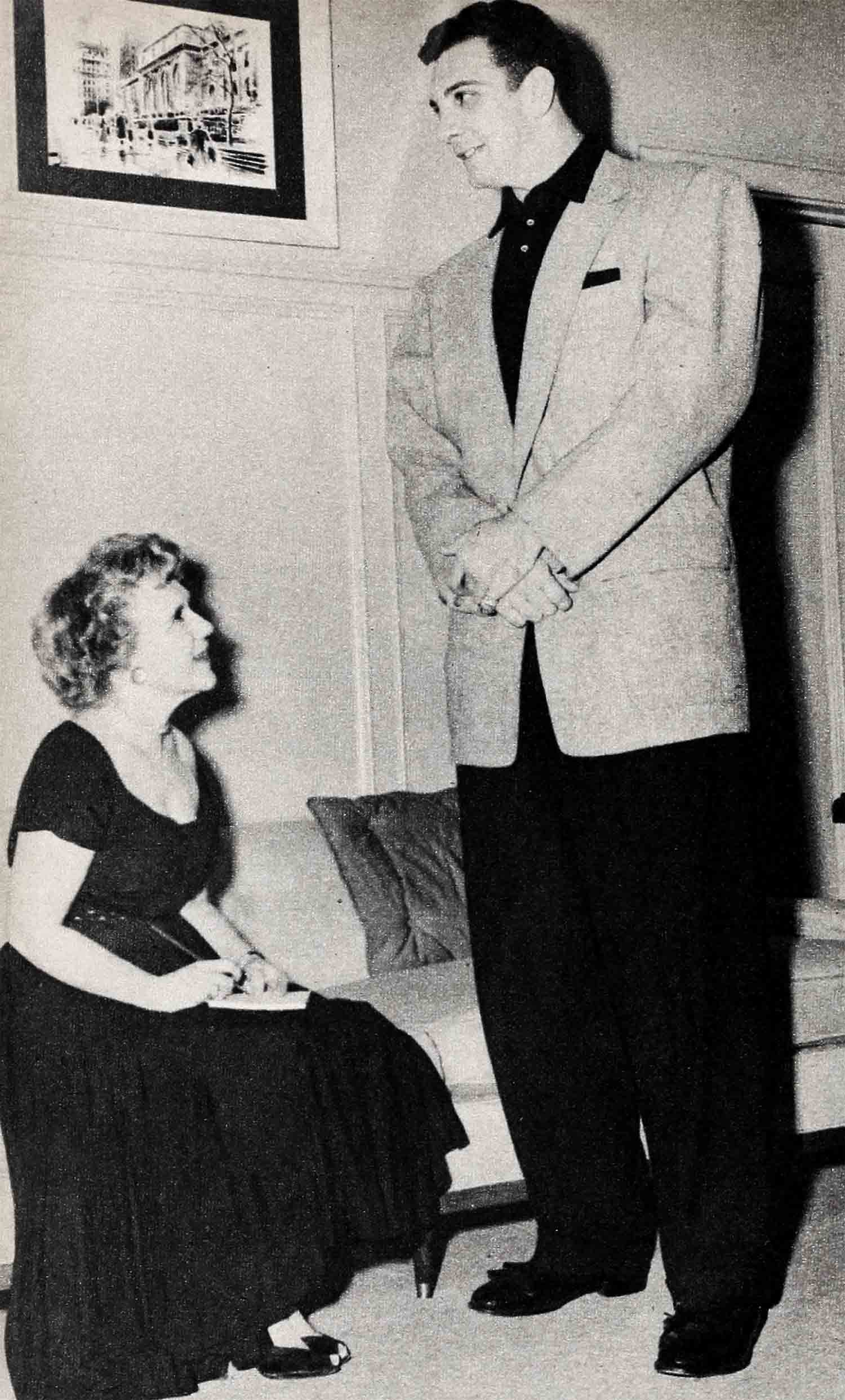
Believe it or not, what gave Mike ideals as strong as his body was the worst possible environment! He ran away from home at sixteen because he couldn’t stand the kidding he had to take. You see, from the time he was twelve, he’s been as big as he is now, although he’s grown steadily in the brain division.
Mike first got a job in a carnival, the only place where no questions were asked and where truant officers couldn’t find him. He unloaded freight, pitched tents, fed animals, from six A.M. to two A.M. For this, he got fourteen dollars a week, terrible food and a bed in a converted bus, along with thirteen other guys. The only difference was that the others were all middle-aged and, without exception, either alcoholics or drug addicts.
That’s why Mike has such a mad on about the subject of “The Man with the Golden Arm.” He has seen the real horror of dope addiction and knows the depths to which a man will descend when he has a “monkey on his back.”
Mike reacted completely against the depravity. He wouldn’t smoke, wouldn’t drink, and hoarded his miserable fourteen dollars a week. He got into wrestling by taking on all comers in the towns through which the carnival passed. About a year later, when he had the price of carfare home to his folks, there was no reality he didn’t know. So fabulous are human beings, this carnival squalor turned him into a sympathetic idealist.
He’s been idealistic ever since, even while winning wrestling championships, and getting discovered by Hollywood. The wrestling world is no bed of roses, either, he says. Love has hit Mike a couple of times, once ‘very seriously. Marriage he feels must be perfect. That’s why he’s waiting.
One thing Mike is still self-conscious about is his size, as I discovered talking to him. “Can you make me sound like a sort of normal giant?” he asked.
I can’t. Actually, Mike is not a giant. Nor is he an average fellow. He’s got much, much more depth than that, much more charm, much more intelligence. Keep your eye on him.
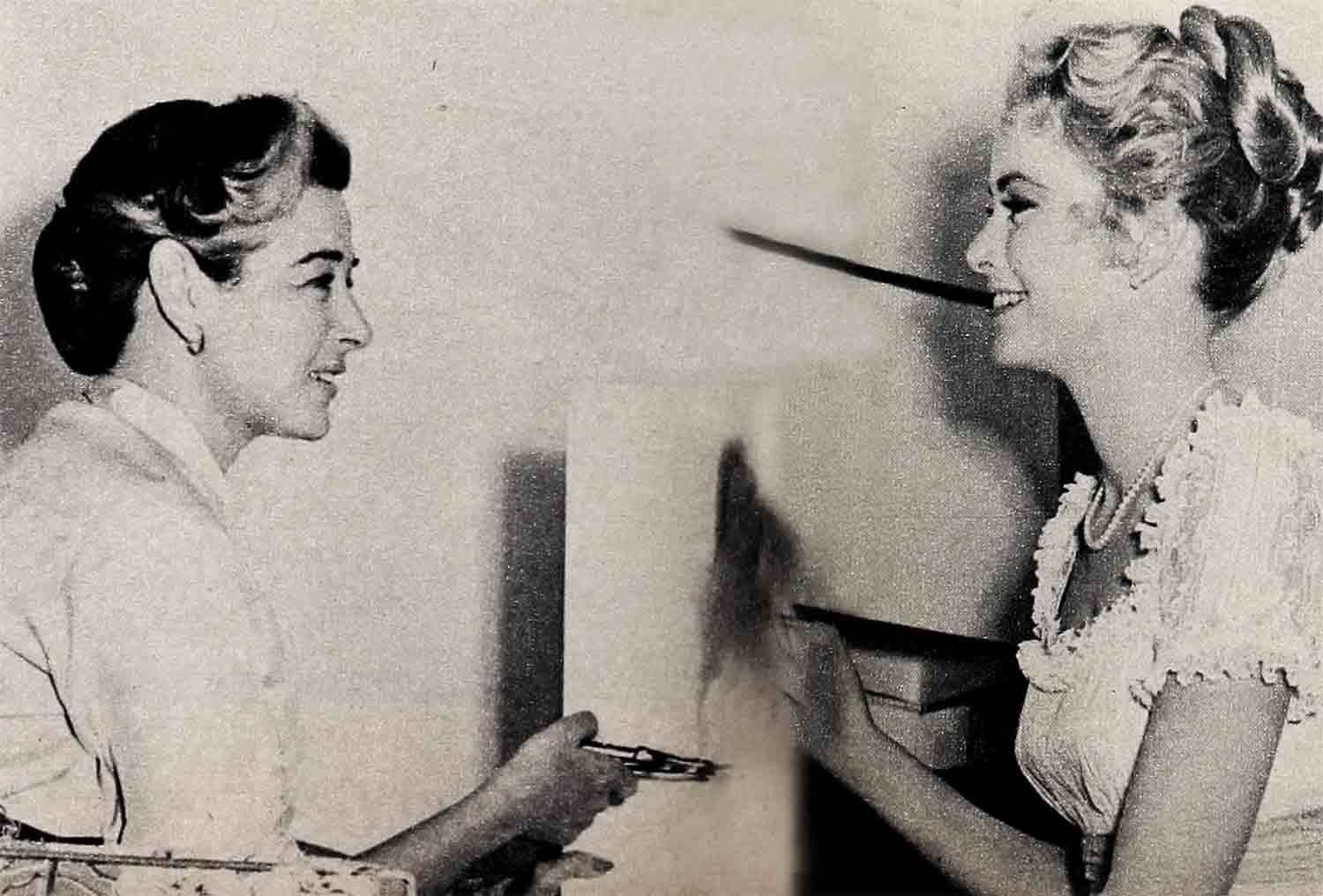
Glamour Gatherings
There was a slim, young girl stand- ing outside camera range the day I slithered onto the set of “The Opposite Sex” through the door which said, “Keep Out. No Admittance. Positively No Visitors. This Means You.”
I wouldn’t have been so bold except I’d run into Annie Sheridan at lunch and she’d asked me over. I knew that, even if they wanted to throw me out, they wouldn’t when I was Ann’s guest. On a set, Annie’s always everybody’s pet. Besides, I’ve known everybody in the company for years—June Allyson; David Miller, the director; Dolores Gray of the fabulous figure; Barbara Jo Allen, who used to be known as Vera Vague; Sam Levene, the stage actor.
But for a moment, I couldn’t think who that slim young girl was standing there watching the action. Then I recognized her. It was Ellen Powell, Joan Blondell’s and Dick Powell’s seventeen-year-old daughter. And there she stood, watching her mother making a movie comeback, while also on the set sat her father’s enchanting present wife.
Right at that moment, the stage door opened and in walked Marlene Dietrich on Mike Todd’s arm. Only a few years ago, Mike Todd was Joan Blondell’s preferred and constant escort.
“The Opposite Sex” is the dressiest picture in years. The clothes that June, Ann, Joan, Dolores, and Joan Collins wear are the end in chic. Still, everything came to a halt as every feminine eye took in the style of Dietrich.

No wonder. With her fantastic face and figure, Marlene was a beige-gold goddess. Her shoes, her hose, her pure silk dress, and over it a full-length coat of suede, her hair, her face powder were all in the exact same shade, a beige so delicate it was like dawn sunlight on a wheatfield. Only her hat departed from this. It was one of this year’s wrapped chiffon affairs, and, although the chiffon was beige, it had an undertone of palest pink, to flatter her provocative face and match her delicate lipstick.
I wonder what young Ellen Powell, in riding pants and a pullover, was really thinking.
It’s an old Hollywood adage but it’s still true: You always get the best news at parties. Take the very exclusive shower which Helen Rose, who designed Grace Kelly’s trousseau, gave for Her Serene Highness. An unexpected guest provided a touching moment.
Do you recall the movie Esther Williams made around the life of Annette Kellermann, who was the swimming sensation of the world before Esther was even born?
Miss Kellermann, still very much alive and flutter-kicking, is a Hollywood resident and a Grace Kelly fan. Hearing about Helen Rose’s party, she called the designer the day it was to be held, and asked if Helen would see that Grace got a little gift she was sending over.
There were twenty guests. Helen figured one more wouldn’t matter. So she invited Miss Kellermann to come in person.
The gift she presented brought tears to Grace’s eyes, for it was a lace hand- kerchief, which years and years ago, the great Metropolitan Opera singer Antonio Scotti had given Miss Kellermann. It was so old and so valuable that it was framed under glass, a romantic gesture reaching from the deceased Scotti of the golden voice, to Annette of the once flawless figure, to Grace of the young, cool beauty.
It was at the Kelly shower that Zsa Zsa Gabor gave her personal answer to that old argument of whether women dress for women or men.
Zsa Zsa had hardly arrived at the party when she brought attention to how chic she was, hair back, dress severe, “high style” from head to toe. “That’s because there are nothing but women here,” she said. “Tonight, I am going to a party where there will be many men, few women. I never waste chic on men. With them I’m just sexy.”
What do you want to bet that Zsa Zsa wouldn’t mind a bit if it were she who was going to be the bride of the man whom Hollywood now says rules a land called Monte Kelly?
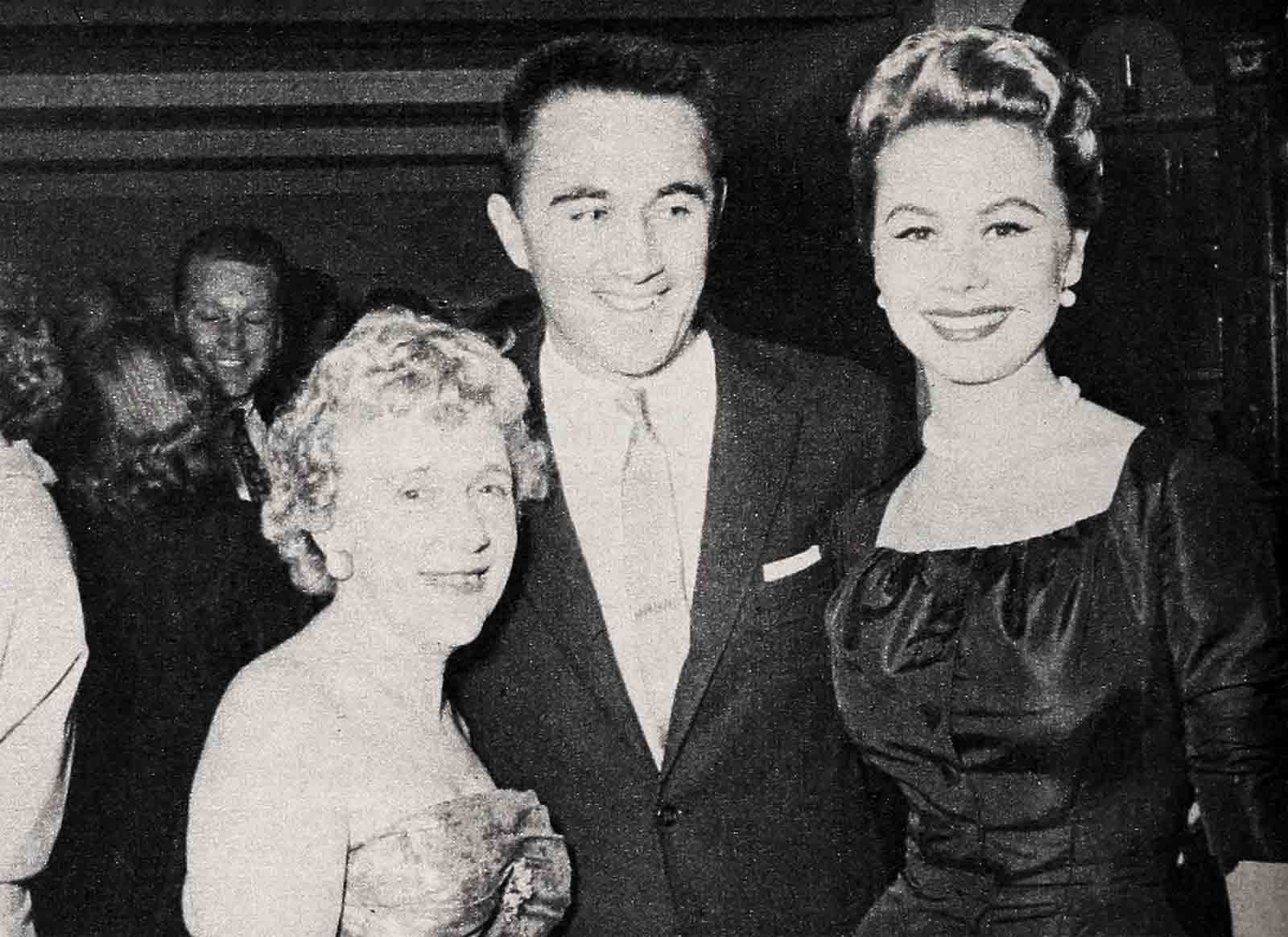
Who’s Who Now?
Personally, I love to give parties. At the cocktail splash I gave for Publisher Irving Manheimer and his wife Ruth, Mitzi Gaynor and I fell into a quick spot of reminiscence about the first lunch we ever had together.
It was five years ago. I was doing an interview with Mitzi and Dale Robertson for the Louella Parsons radio show. Dale and Mitzi were the hot newcomers of 1951. And that was exactly all they had in common, as our conversation soon proved. Dale lounged on the table, a black scowl on his face as he expounded how he was only in the movie business for the money. The faster he could get it, the faster he’d get out, he said.
“But you can’t really feel that way,” Mitzi said. “I don’t mean to be arty, but think of the growth a career gives you, and the fun of it. Think of the opportunities for self-development, for learning, for—well, everything.”
Dale glowered and, in effect, told Mitzi she was a naive dreamer. Soon after, “Golden Girl,” Mitzi’s big film, came out and flopped, while Dale’s picture clicked. Mitzi was dropped by Twentieth Century-Fox, Dale was kept. For a couple of years, it certainly looked as though he was the winner of the argument.
But the old rules apply in Hollywood just as they do other places. Sincerity, application, liking people, self-discipline, all count in the long run. Today, slim, beautiful Mitzi is bubbling over with marital happiness with her wonderful husband, Jack Bean, and has Hollywood at her feet since “Anything Goes.” At the same time, divorced, still glowering Dale merely turns up in an occasional “B” picture.
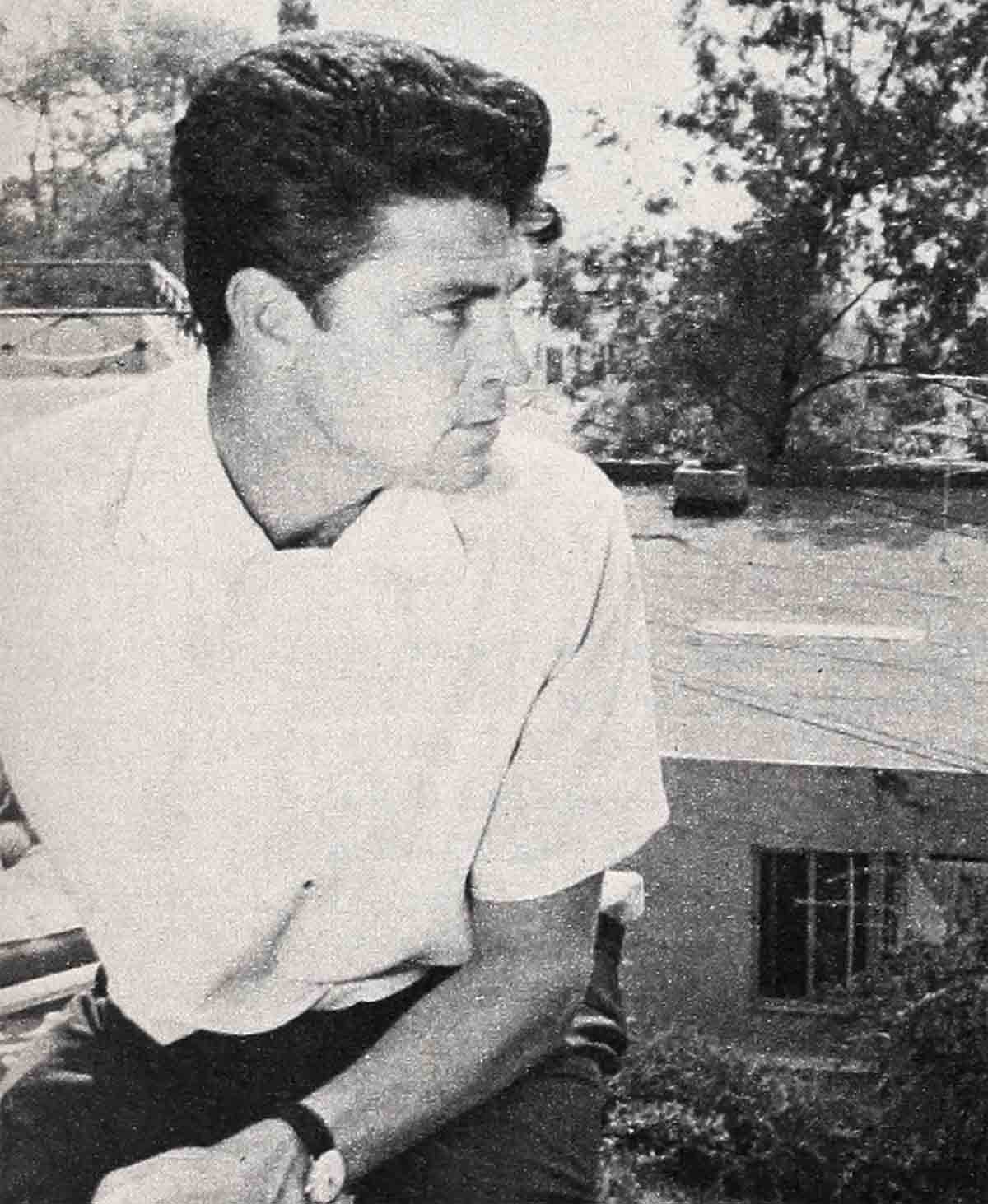
Pop Plays Post Office
Proof of how right you readers of Photoplay were in picking Pat Wayne as a star of tomorrow is the very glossy fact that in the last couple of months, Pat’s dad has turned down more than $100,000 in offers for the boy’s service.
The second vivid proof is visible in “The Searchers,” in which Pat has a small but showy role and plays it with humor and charm.
But the third proof of how sharply this boy has impressed the public is the one I like best. “Old man” John Wayne told me this one, at a party at Bob Mitchum’s. Seems as how he, the old man, walked into his secretary’s office one day recently and saw a pile of fan mail, the likes of which he hadn’t glimpsed for months. Naturally, that pleased him, until he discovered that out of a couple of thousand letters, six were addressed to him, John Wayne. The others were addressed to Mr. Pat Wayne.
Old man, my eye! The handsome, vital Duke’s a completely happy man these days, what with his oldest son, Mike, joining him in production, Pat proving to be a fine actor, his daughter, Toni, getting married, and Duke, himself, a brand-new father again. Pilar Wayne, the third Mrs. Wayne, adores her big, tall husband and he adores her. Tribute to the finesse of the Duke’s personality, is the way he and Jo Wayne, his first wife, have collaborated over daughter Toni’s wedding. Tribute to something pretty gallant on both their parts, too, is that Jo has never remarried, and when you encounter her at Hollywood parties she always says, “Is it true John’s happy? I’m so glad.”
Jo and John agree completely about Pat’s future. He’s only sixteen now. Duke thunders at him, turning down offers for him, “You’ll finish college first. That will keep you from being my competition for four more years.” “Sure, dad,” Pat grins. He’s a good student and he’ll be out of college by the time he’s twenty. Besides, Pat expects to pick up some small change during vacations. Something like $50,000 this summer.
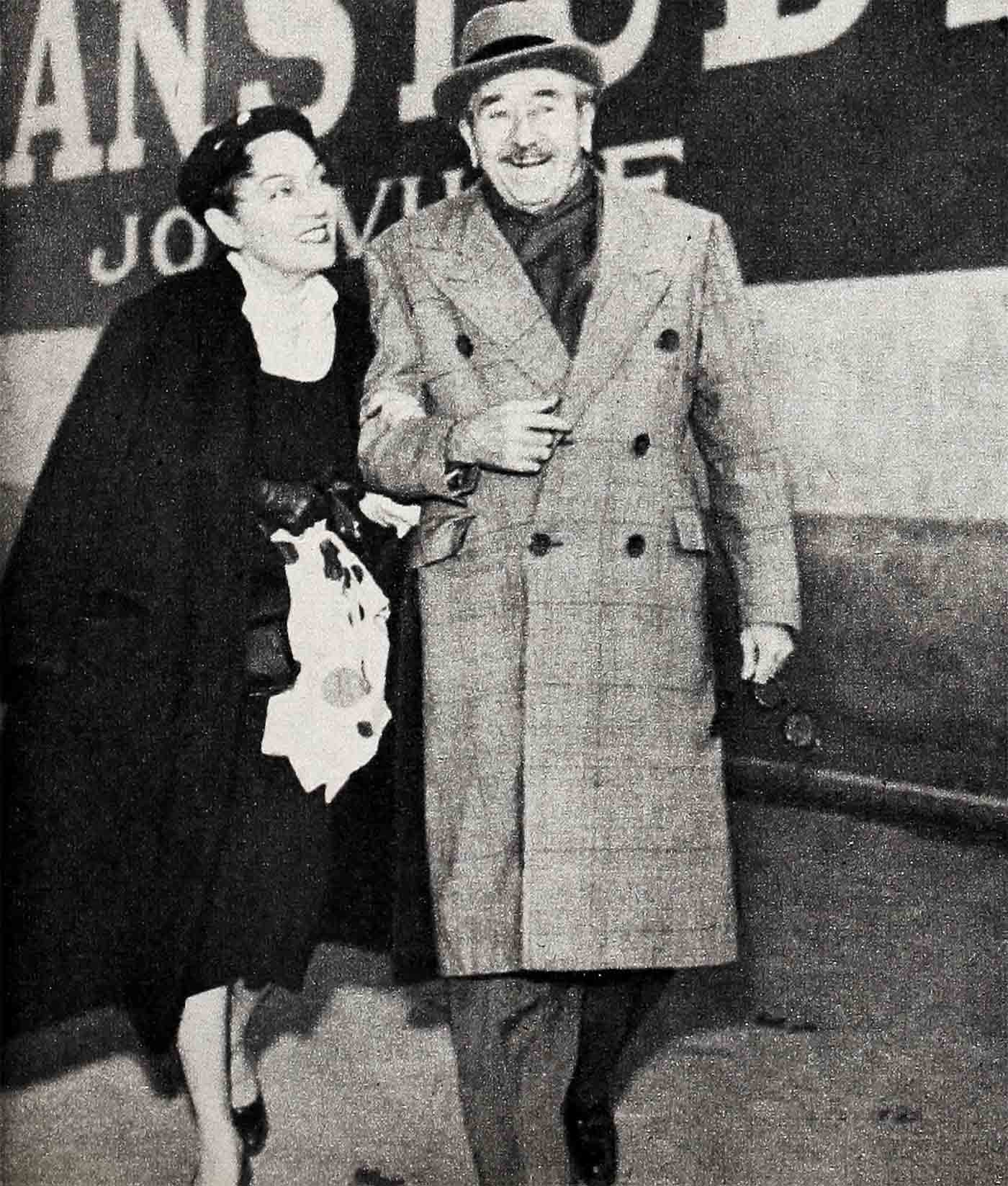
Designing Females
Hollywood’s top clothes designers, such as Edith Head and Helen Rose, of Paramount and M-G-M respectively, are certainly keeping a sharp eye out for U. A.’s forthcoming film, “The Ambassador’s Daughter.” Edie, who has won more Oscars than anybody in the fashion end of Hollywood, has been busily engaged in dressing Audrey Hepburn. Helen Rose not only has the Grace Kelly trousseau to her credit, but has “The Opposite Sex” coming out to show what she can do with a fashion show.
However, “The Ambassador’s Daughter” has Christian Dior—some $50,000 worth of his dressmaking genius on the back of Olivia de Havilland, who up until now has never been distinguished for her chic. In fact, if M. Dior has succeeded in making Olivia look like a smartly-dressed woman, he is a genius, and that is just what Hollywood’s designing women are afraid of.
All of “The Ambassador’s Daughter” was shot in Paris, to give it more sartorial elegance. Gloria Swanson, now in the clothes designing business herself, was a frequent visitor to the set while she was in Paris this spring. It was to Gloria, his old friend from the earliest Paramount days, that Adolphe Menjou—who plays a gentleman of note in the film—confessed he didn’t believe he could keep up his personal title of best-dressed man much longer. He admitted it cost him better than $15,000 a year.
Gloria didn’t let out a peep, but that didn’t stop everybody from wondering how she felt as she looked at Olivia, now married to Frenchman Pierre Galante and very happy. Gloria gave up $30,000 a week to marry a Frenchman—the Marquis de la Falaise de Coudray—and was also very happy. Not that Falaise insisted upon that, but this was in the good old days, before income tax, when $30,000-a-week pay was also what you took home. In those days, Gloria thought she could get away with anything. She just about could, too. Who can blame her if she’s a bit bitter now?
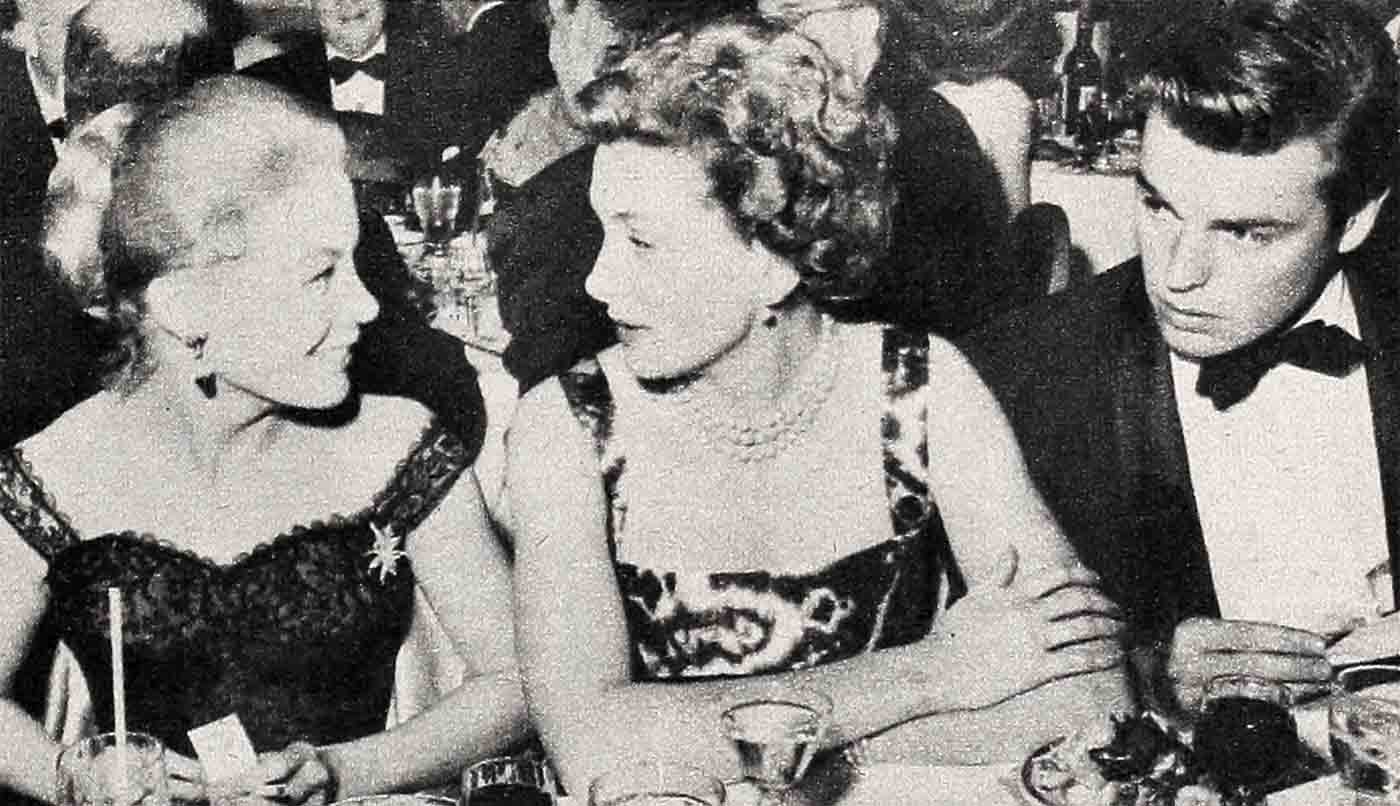
Tribute To A Star
Seeing Deborah Kerr and Jean Simmons hobnobbing together at the Foreign Press Association dinner, I wondered if either of them remembered that once upon a time, long before Deb had met Tony Bartley or Stewart Granger had met Jean, Deborah and Stewart had almost become serious about one another.
Their devoted friendship has remained trusted and true. It was to Stewart that Deborah went for professional advice in the dark days of her career, when M-G-M was saying that she had no personal appeal. Stewart, among others, advised her to go to Broadway. Thus it was that her appearance in “Tea and Sympathy” led to the movie “From Here to Eternity.” Now, with “The King and I” forthcoming, Deborah demonstrates such purely female charm and such vivid acting that every studio is after her. Her finest personal quality is one which Jean Simmons and Jimmy Granger also have—a true gift for friendship. Without exception, Deborah is adored because her beauty and sympathy are spiced with lively wit. For example, at the Foreign Press Association dinner, where you could build a stockpile from the broken English, Deborah began her speech by saying, “Please pardon my British accent.”
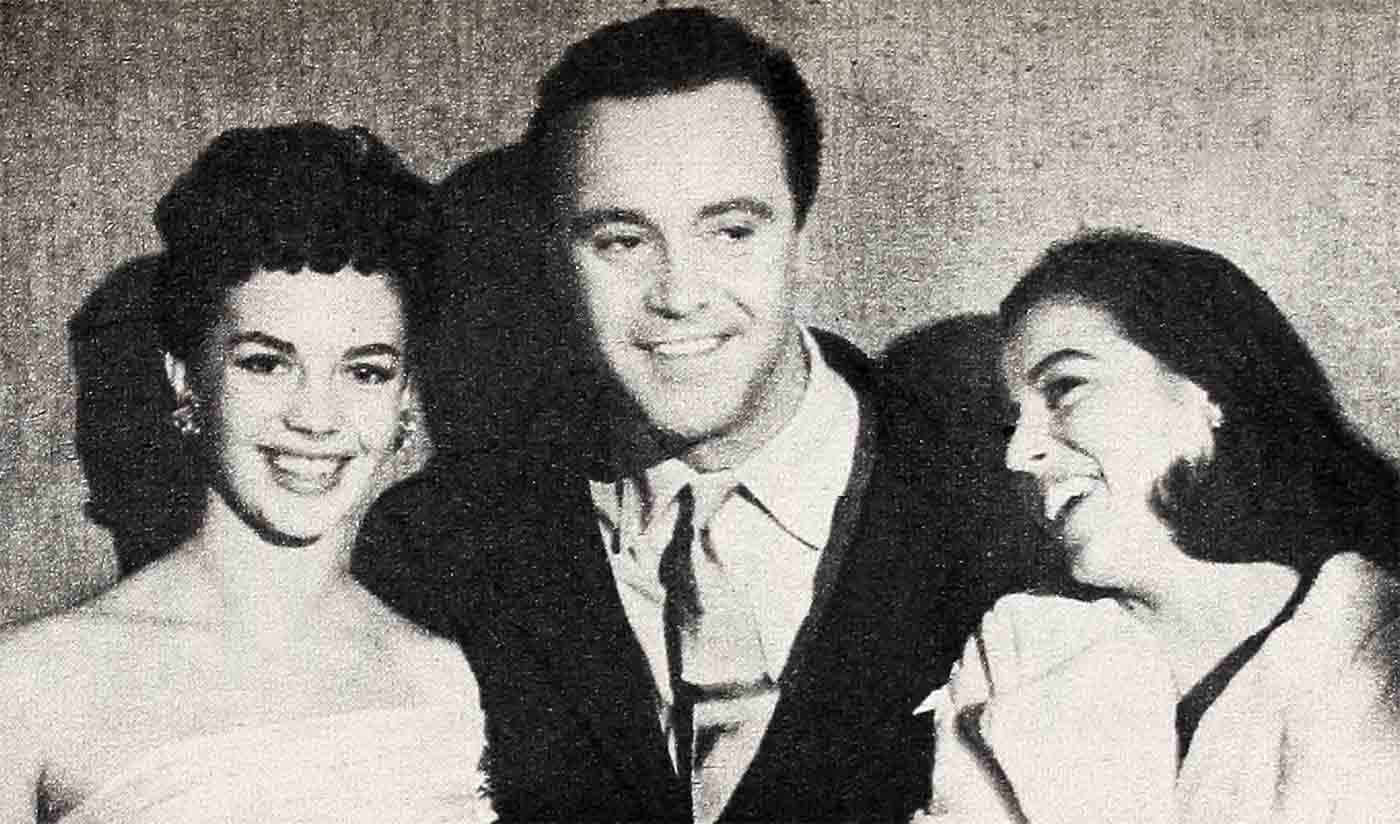
Never A Dull Moment
They could have turned off the sun at the Academy Awards nominations when Jack Lemmon romped in for his role in “Mister Roberts.” Jack had himself demoted from star billing into supporting category to give himself a chance at this honor, but his bouncy warmth was only one-third due to his win.
It’s no accident that Jack’s a comedian. He sees the humor in everything. At the nominations, he came galloping down from the stage and said to me, “I’ve just had the kind of job you can’t hardly get any more. I’ve been up there catching women—and what women!”
What had happened was that Marisa Pavan had nearly fainted when she got’ her nomination for “The Rose Tattoo.” She would actually have fallen, if Jack hadn’t caught her. “If you know actresses,” beamed Jack, “you know a thing like that is contagious. So I just stood by. That way I got Eleanor Parker to fall for me—right into my eager arms.” Next, Natalie Wood wasn’t above a bit of a totter when “Rebel Without a Cause” brought her within shooting distance of the Oscar.
Incidentally, in the real top-star category, where Eleanor is, the Hollywood whispers run that one of the actresses who was nominated will be nominated again and again, as she has in the past. But she will never win, as she has not in the past, because she can’t be bothered with making friends while working on the set.
It was at the nominations get-together, by the way, that Marisa and Natalie discovered one big bond they have in common: both are in love with men twice their ages. While Marisa has already taken the big step and married Jean Pierre Aumont, Nat thinks she is in love with Raymond Burr. However, Nat’s mother is sitting by quietly, and hopes she will get over this, as she has other loves, measles and awkwardness.
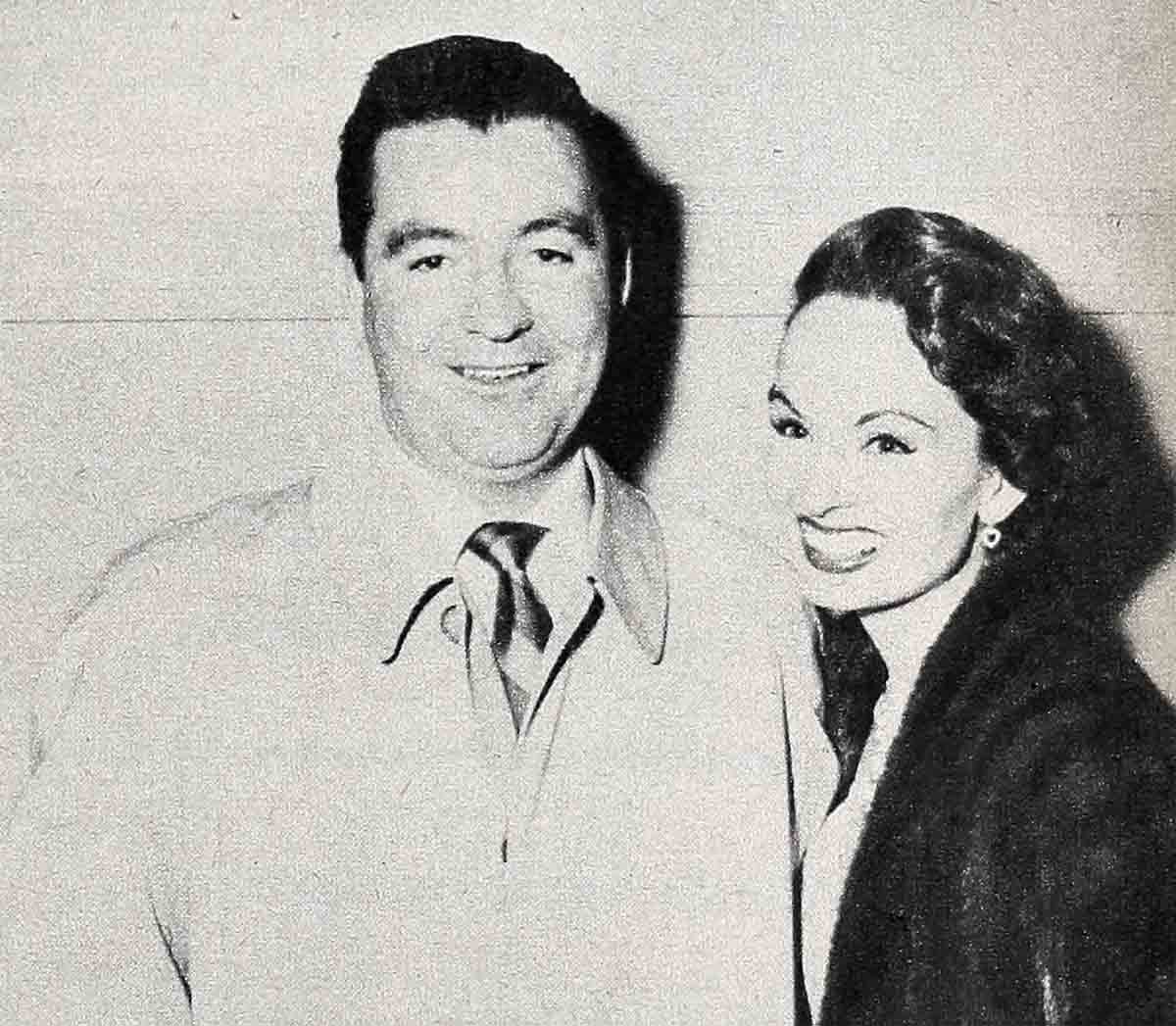
Sweet And Lovely
I’ve never recovered from the flattery of Ann Blyth’s having called me to give me the first long story of her engagement to Jim McNulty, nor of Jim’s having kissed me the first time we met. He said that was because Ann had told him what a good friend I was. I told him that put me in the biggest group in Hollywood. I literally have never met anyone in Hollywood who doesn’t dote on Ann.
For this reason, it was with real regret that M-G-M permitted Ann to tear up her exclusive contract with them. But it was typical of Annie. In her own gentle fashion, she always gets what she wants, and this time, following Gordon MacRae’s example, she’s releasing herself from M-G-M so that she can go gunning after the musical version of “Peg o’ My Heart.” Annie told me at the Academy nominations party that this role is one that she has always yearned for. So purely Irish—by birth and marriage—Ann feels, and rightly, that she could do justice both to the acting the part demands and to the singing score.
However, another Irish girl is opposing her—Margaret O’Brien, no less. And Maggie’s personal manager, director David Butler owns the right to “Peg.” To complicate this, there’s that new living doll, Shirley Jones, who scored such a smash in the biggest musical of many a year, “Carousel.” Nevertheless, I’m betting on Ann. I’ve never seen her miss a thing she went after yet. Not only did she have her children in the ideal order—a boy first, then a girl—but she even has the right kind of metabolism! The lucky creature, she has to diet to put on weight.
THE END
—BY RUTH WATERBURY
It is a quote. PHOTOPLAY MAGAZINE JUNE 1956




